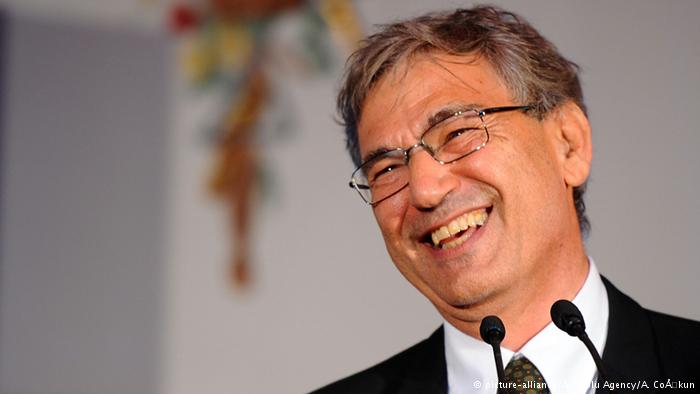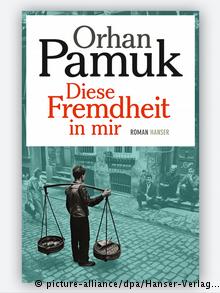Books
Orhan Pamuks new novel: “The strangeness in me”
Not for the first Time Orhan Pamuk in his hometown of Istanbul, a literary monument. In Cologne, the Nobel prize winner now has his novel about the Disappearance of the old world, and a great love.

Mevlut is an almost extinct profession, he is a Boza-seller: According to calling, he goes through the winding streets of Istanbul and offers a drink made of fermented millet. Boza is only slightly alcoholic, so that it is also of the pious Muslims tolerated and consumed. However, in the modern metropolis is for men like Mevlut no more room, he needs to be as car-Park attendant and Stromableser be employed, with Boza is no more money to make.
And also in love, he has no luck: for Three years, he has letters to his Choice in Anatolia, but then sends him the family of their older sister. Mevlut she marries dutifully, the actual beloved gets just a childhood friend to the woman. This is the starting point of the story with the subtitle of “adventures and dreams of the Boza-seller Mevlut Karataş and his friends, as well as from numerous perspectives erzähltes Panorama of Istanbul life between 1969 and 2012”.
About the collective gloom in Istanbul

The book, Orhan Pamuk is currently on a reading tour through Germany presenting, is an epic widely told homage to the old Istanbul, that city, to the Modern soft, and whose loss Mevlut Karataş and his friends experience first hand. “Hüzün” is the keyword that the mood of the novel shapes: a collective melancholy, the past, culture, size and magnificence recalls. “Hüzün” means, literally, gloom, sadness, but there is still so much, much more: It is “the feeling with the last century Istanbul and its inhabitants in the most intense way have been infected,” said Pamuk once. If it were not for the melancholy of the Individual, but to a million people at the same time, perceived “black feeling”.
Istanbul in the glass case – abolished, preserved, and remembered. The Turkish metropolis in the area of conflict between Islamic values, their own Tradition and the desire for the West to play in Pamuks novels, so also in his new work, “The strangeness in me”, an important role. Very carefully, he observed the many changes in the metropolis on the Bosporus. It is to be understood the writer by no means as the town-chronicler. “I always have to smile when me Western media as the ‘Istanbul writers’ call,” he says. “Here I write but only about the thing that makes me a life long surrounded, and what I you best know.”
Literature between the Occident and the Orient
Orhan Pamuk, born in 1952, grew up in a secular family of Istanbul’s upper class, for which Turkey is a natural part of Europe. Pamuk visited American schools and read many Western classics such as Tolstoy, Proust, and Kafka. Today, is reflected in his novels the Identitätsproblem many Turks – torn between Orient and Occident. In 2006 was awarded to Orhan Pamuk the Literaturnnobelpreis, in the Eulogy, the Jury praised his work as “a dense and diverse fabric of black Humor, blitzendem perspicacity, sensual, strong, visually-driven presentation, kriminalistischer powers of deduction and romantic longings in the consciousness of the boredom of reality.”

By far the world’s meistgelesenste writers of Turkey
The award brought the Turkish writers worldwide attention, his books are now available in more than 60 languages. In the German language are so far 13 novels and volumes of essays to date have been published.
Whether it was the Nobel prize had changed, asked recently a guest at a reading in Washington. “I have my publisher always said: The Nobel prize will not change anything. Now, I must admit that this is not true. It changes everything,” said Pamuk, adding ironically: “I can but only recommend to everyone.”
Actually wanted to Orhan Pamuk to be a painter. As the son of a Ingenieursfamilie he decided, however, at first to study architecture, then switched to journalism. At this time, prevailed in the Turkey’s political Chaos: the Extreme left and right wing, clashed on each other, finally, rallied the military and took Power. “Writing is the possibility of using words to raise a voice of painting, however, means dumbness, and I was, mentally, not so far, this muteness in Would endure,” said Pamuk in his decision in a newspaper interview.
Painted Novels
His love for painting is still clearly felt: The observations and descriptions are often so detailed and the lighting looks determined, that the reader is the scenes right before their eyes. “I create paintings,” says Pamuk. “But I’m not nostalgic. Of course I hope for example of the bad political conditions of the 70s back or not, the former exploitation of workers.” Rather, he would like to present the changes, the Horror of growth”, with a population in Istanbul of a Million inhabitants in 1950, to today’s 15 million.

Istanbul – the metropolis plays in the novels Pamuks a Central role
His critical views are home to criticism has Pamuk often the addition of “political author”, a designation which he only partially shares. Especially taken in 2002 his book “the snow”, 2005, also in German Translation appeared. Here kindles Pamuk is a conflict around a head scarf ban between the Turkish and Kurdish National, the army and Islamic fundamentalists. In a newspaper interview he said later: “The small city of Kars, in which my action takes place, should actually be called the microcosm of Turkey be understood. After the terrorist attacks on the World Trade Center, I began to understand that the problems of Turkey the problems of the world. And that the governments of the world responded the same way as the old Turkish power elite: The only answer to the rise of political Islam, were bombs.”
Despite the death threat steadfast
Even if Pamuk, his books are not as politically look at, he represents as a writer but clearly his opinion and supported a number of campaigns: against Mega-dams in Turkey, against the Buchhandelsgroßmacht Amazon or for more freedom of expression in Russia. As he in a newspaper interview in 2005, the Turkish mass murder of the Armenieren in the First world war was criticised, it was because of the “public disparagement of Turkishness” charges. At times it was Orhan Pamuk due to threats on personal safety dependent and occurred in 2006 – although always closely with Istanbul – a Professor at Columbia University in New York, where he has since been regularly taught.
But his heart, the will, in its literature more clearly than, depends in Istanbul. You can also feel this in every line of “This strangeness in me”. The title, by the way, comes not from himself, but from a poem of the 1850 deceased British poet William Wordsworth. He is one of Orhan Pamuks Lieblingspoeten – because both share the same feeling for romance.
